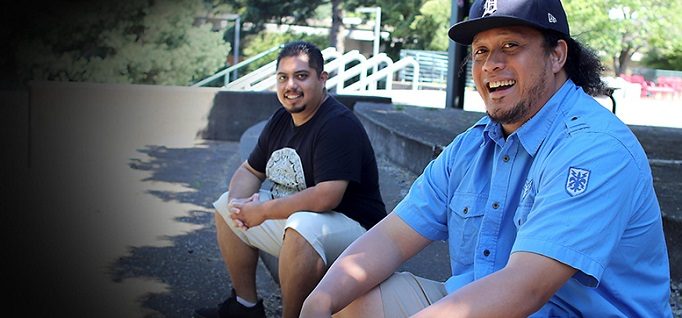Programs for men of color aim for persistence, completion
By Ed Finkel
June 16, 2021
An Oregon college gives men of color a space in which to grow and succeed
Community college students who are men of color face a wider array of hurdles than many of their peers, ranging from profiling on the part of police, to heightened financial challenges in persisting and completing their degrees. At least some colleges have found that the demographic group’s overall success lags behind their student populations on the whole.
In response, an increasing number of two-year institutions are creating special programs for Black and Brown males to create a cohort that provides encouragement and support for one another while receiving added attention from the administration and faculty. The greater impact of Covid on Black and Brown communities and the intensified attention to racial profiling in the wake of the George Floyd killing has underscored the need for such programs, administrators say.
Making connections in Portland
The Men of Color Leadership Program at Portland Community College in Oregon dates back to the Great Recession of the late 2000s. It began as a pilot program in 2007 and ramped up in 2010, centered around a series of courses for which the 15 to 20 students who typically participate can earn seven to nine credits per year.
The coursework covers subjects like college “survival,” career and life planning, men’s health and exploring identity, says Clifford Meeks, assistant coordinator.
“They’re able to talk about different aspects of their identity and how they are impacted as they matriculated throughout higher education,” he says. “Other aspects include community-building — that’s one of the very tenets of their program. The cohort doesn’t flourish unless community is established early on.”
Although it doesn’t have a GPA requirement, the Men of Color Leadership Program promotes academic excellence while connecting participants to community- and campus-based resources, from counseling, to scholarships, to technology opportunities, Meeks says.
“We tell them, ‘This is about building bonds and trust,’ not just with us but amongst themselves,” he says. “We encourage them to connect with each other outside of class, as well as take classes with each other, especially if they are in the same field of study.”
Recruiting students
The program always has looked at the participants and their education from a social justice lens and encouraged community service that benefits the students in addition to those they serve, Meeks says.
“As a person of color, what are your responsibilities and contributions to society?” says Mak Porotesano, program coordinator. “We not only show them how to navigate their oppressed identities, but how do they navigate their oppressive identity, which is male privilege. … We tackle toxic masculinity, hyper-masculinity and homophobia.”
The program encourages students to express emotions to one another, Porotesano says.
“Men are uncomfortable saying ‘I love you’ to other guys,” he says. “By the end of the year, that’s not a problem. They’re hugging. They have friends on the other [side of the] spectrum, trans folks who are in the class. They’re saying, ‘I can be better for you.’”
Meeks and Porotesano recruit students in traditional and non-traditional ways, ranging from posting flyers around campus, to reaching out to students frequently hanging out at the campus multicultural center where their offices are housed. They have built relationships with departmental advisers who recommend the program to certain students.
“There’s a lot of warm handoffs, where advisers will literally walk them to our offices,” Meeks says. “They can see that this is a real space, with real people.”
Meeks also spends time in the cafeteria talking to students and connects through their friends and even alumni of the program. Prior to Covid, “We would have former students dragging students in, saying, ‘You need to take advantage of this,’” he says. “I did a lot of cold-calling. When a student realized it was from PCC, the dynamic changed. At first, they were treating it like a robocall. They saw a message was left, and I would usually get a callback.”
There’s more to the story! Read the full article in CC Daily.



